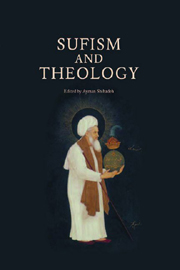Book contents
- Frontmatter
- Contents
- Contributors
- Acknowledgements
- Introduction
- Part I Mystical Theologies
- 1 Mystical Theology and the Traditionalist Hermeneutics of Maybudī's Kashf al-Asrār
- 2 The All-Comprehensive Circle (al-Iḥāṭa): Soul, Intellect, and the Oneness of Existence in the Doctrine of Ibn Sab'īn
- 3 One Aspect of the Akbarian Turn in Shī'ī Theology
- 4 Sufism and Theology in the Confessions of Ṣā'in al-Dīn Turka Iṣfahānī (d. 830/1437)
- 5 A Sufi Theology Fit for a Shī'ī King: The Gawhar-i Murād of 'Abd al-Razzāq Lāhījī (d. 1072/1661–2)
- Part II Theological Approaches to Sufism
- Index
1 - Mystical Theology and the Traditionalist Hermeneutics of Maybudī's Kashf al-Asrār
from Part I - Mystical Theologies
Published online by Cambridge University Press: 12 September 2012
- Frontmatter
- Contents
- Contributors
- Acknowledgements
- Introduction
- Part I Mystical Theologies
- 1 Mystical Theology and the Traditionalist Hermeneutics of Maybudī's Kashf al-Asrār
- 2 The All-Comprehensive Circle (al-Iḥāṭa): Soul, Intellect, and the Oneness of Existence in the Doctrine of Ibn Sab'īn
- 3 One Aspect of the Akbarian Turn in Shī'ī Theology
- 4 Sufism and Theology in the Confessions of Ṣā'in al-Dīn Turka Iṣfahānī (d. 830/1437)
- 5 A Sufi Theology Fit for a Shī'ī King: The Gawhar-i Murād of 'Abd al-Razzāq Lāhījī (d. 1072/1661–2)
- Part II Theological Approaches to Sufism
- Index
Summary
In this study I shall address a hermeneutical puzzle that seems to present itself in a Persian commentary on the Qur'ān, the Kashf al-asrār wa-'uddat al-abrār (Unveiling of Mysteries and Provision of the Righteous), composed in the early 6th/12th century by the little-known scholar and mystic, Rashīd al-Dīn Maybudī. Having outlined the nature of the puzzle, I shall then attempt to solve it by examining what might be called the ‘mystical theology’ of the Kashf al-asrār, that is, the esoteric dimensions of theological dogmas that underlie the work. Since Maybudī's Kashf al-asrār is not widely known outside the Persian-speaking world, it will be appropriate to begin with a brief introduction to the commentary and its unusual structure, which has not only hermeneutical but also theological significance for Maybudī.
The Kashf al-asrār was begun in the year 520/1126, and apart from this date we have no biographical data about Maybudī. According to the author's introduction, the work was based upon a now no longer extant commentary by the Hanbalī mystic, Khwāja 'Abdullāh Anṣārī (d. 481/1089), and the influence of Anṣārī's dogmatic views, as well as of the literary style and spirit of his famous Munājāt is fully evident in the Kashf al-asrār.
An interesting feature of the Kashf al-asrār is its threefold structure. The Qur'ān is divided into sessions (majlis-hā) comprising anything from five to fifty or so verses. The commentary on each of these sessions is then presented in three parts, called nawbats (lit. ‘turns’). The first nawbat consists of a translation or concise rendering of the verses in Persian; the second is the exoteric or conventional commentary, and the third is the esoteric or mystical commentary, which Maybudī himself defines as comprising: ‘the allegories of mystics (rumūz-i ‘ ārifān), allusions of Sufis (ishārāt-i sūfiyyān), and subtle ‘associations’ of preachers (latā’if-i mudhakkirān).’
- Type
- Chapter
- Information
- Sufism and Theology , pp. 15 - 30Publisher: Edinburgh University PressPrint publication year: 2007



